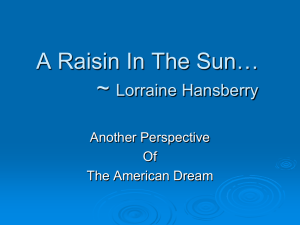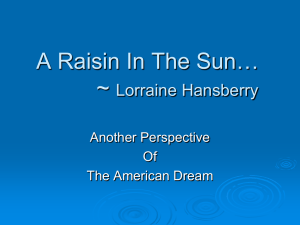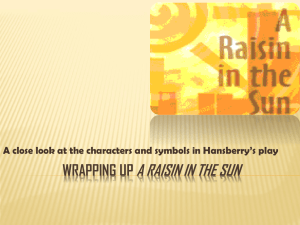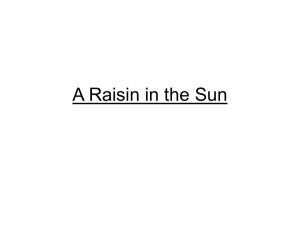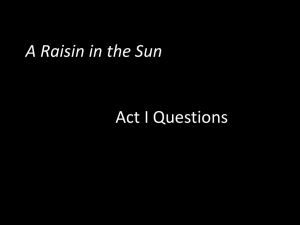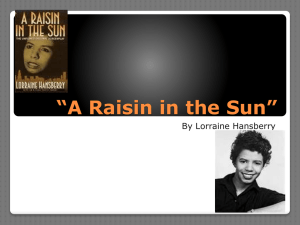File - Beneatha Younger
advertisement
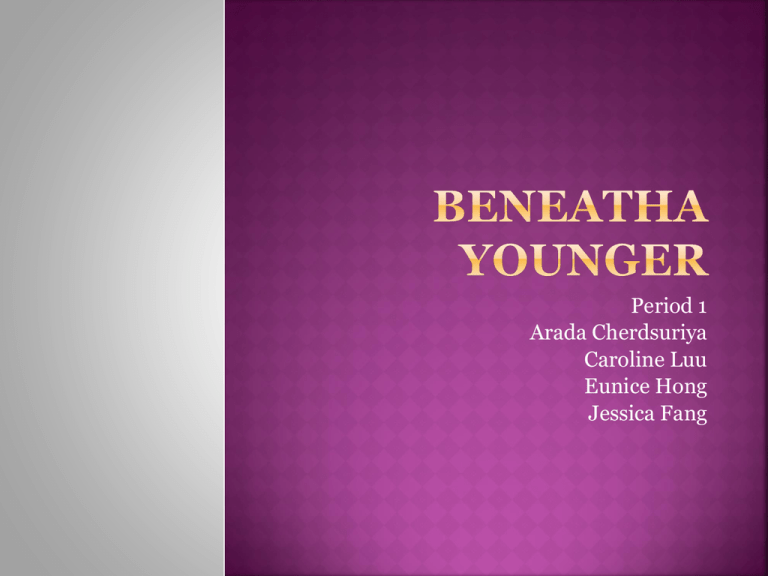
Period 1 Arada Cherdsuriya Caroline Luu Eunice Hong Jessica Fang Mei represents Beneatha Like Beneatha, Mei wants to pursue a dream that isn’t accepted by her family members She wants to become an artist while Beneatha wants to be a doctor She also shows her persistence of reaching her goal even when her parents don’t support or believe in her Other characters like George Murchinson and Walter don’t believe Beneatha could be a doctor, they even suggest being a nurse Mei tells Shang that she doesn’t care her parents don’t pay for art school and insists that she will raise the money for art school herself Beneatha also insisted that Mama use her retirement money for herself and she will study to become an doctor no matter what Mei’s parents were very traditional and didn’t believe she should go to art school Ruth& Mama are traditional and believe she should focus more on an education Beneatha is a symbol of the feminist movement: Doesn’t believe in religion “It’s all a batter of ideas, and God is just one idea I don’t accept. It’s not important. I am not going out and be immoral or commit crimes because I don’t believe in God. I don’t even think about it. It’s just that I get tired of Him getting credit for all the things the human race achieves through it’s own stubborn effort.” In society, women held domestic roles while the women of Beneatha’s generation started to expand their education. Unlike her family members who weren’t as educated as her, they believed in religion. Since Beneatha was more educated, her principles stuck more on reason. She doesn’t believe in traditional marriage “I couldn’t ever really be serious about George. He’s-he’s so shallow. I know he’s rich. He knows he’s rich, too…No I would not marry him if all I felt for him was what I feel now.” While Ruth and Mama believed that George would be a good husband because he could provide financially, Beneatha focused more on how she felt towards him. The women of the feminist movement focused more on the technical aspect of both sides of the relationship. Her drive to expand her education & become a doctor. “I just want to learn to play the guitar. Is there anything wrong with that?...I experiment with different forms of expression…Listen, I’m going to be a doctor. I’m no worried about who I’m going to marry yet-if I ever get married.” While the traditional women didn’t care so much for education, Beneatha went ahead and explored more things to expand her knowledge. While everyone else told her to drop her dream of becoming a doctor or even become a nurse, she showed her perseverance in sticking to her goals. While traditional women would’ve listened to the men, Beneatha followed her heart. She strives to find her individuality& tries to break from society’s norms “I hate assimilationist Negroes! It means someone who is willing to give up his own culture and submerge himself completely in the dominant, and in this case oppressive culture!” She understands how people conform to society’s roles, especially when their own identities are morphed to fit what society wants. Beneatha cuts her hair, puts on Nigerian clothing, and dances a Nigeria folk dance. She’s sick of the society’s roles and wants to find who she really is by connecting to her roots. When she tries guitar and pursues a career as a doctor, she’s trying to find her individuality. Since Beneatha is the only one in her family that receive a decent education, her ways of speaking towards others are different from the way her family talks. She’s more sophisticated and sounds more professional when she talks to others. “I don’t flirt! I experiment with different forms of expression. People have to express themselves one way or another.” Her family uses broken english and slangs. “Nevermind how I feel. You got any more to say ‘bout how people ought to sit down and talk to each other..?”-Walter Beneatha sounds more trustworthy than her mother, brother, and sister-in-law Beneatha is a medical student trying to become a doctor This task is hard to accomplish because she is a colored woman who comes from a lowincome family She has minimal support from her family and George (who represents traditional women values) She does have support from Asagai(who represents the feminist movement) Beneatha is known as “One for Whom BreadFood-is not Enough” She needs more than the norm and likes to express herself. Beneatha ‘s family sees her desires to do things just for the fact of learning new things as useless. Asagai criticizes her for being too “assimilated” She shows her individual/ feminist movement side by cutting her hair and trying on a side by cutting her hair and trying on a traditional Nigerian dress She is on her way to being her individual self. Beneatha’s education plays a big role in her everyday diction with everyone in the play. Though her family talks in a ghetto, slanged, and uneducated diction, Beneatha chooses to speak very formal, grammar-wise. As opposed to Mama’s diction, very slanged and ghetto (“Ain’t nobody trying to stop you. I just wonder sometimes why you has to flit...”), she is very formal and doesn’t talk like her family members . “I don’t flit! I-I experiment with different forms of expression-”. Story takes place during the middle towards the late 20th century. The family also live in an African American neighborhood in Chicago. Although Chicago is very lenient towards African American than the Deep South, the family experienced racism and discrimination. When Mama bought a house in a white neighborhood, Linder offered them money to buy a new house because the people in the neighborhood do not want African Americans to live next to them. The Younger family experienced tough economic situations, but these situations did not stop Beneatha dream of becoming a doctor. “That money belongs to Mama, Walter, and it’s for her to decide how she wants to use it. I don’t care if she wants to buy a house or a rocket ship or just nail it up somewhere and look at it. It’s hers. Not ours-hers.” This play takes place in Chicago in the 20th century, during the fight for African American rights. Lorraine Hansberry is an African American writer who also lived in Chicago during this time period. In the play, the Younger family decides to move into Clybourne Park, a predominantly white neighborhood, where African Americans aren’t welcomed. “It is a matter of the people of Clybourne Park believing, rightly or wrongly, as I say, that for the happiness of all concerned that our Negro families are happier when they live in their own communities.” Just like the Younger family, Lorraine Hansberry moved into Washington Park Subdivision, a predominantly white neighborhood where African Americans weren’t welcomed. Just by living in Chicago, Hansberry can easily incorporate the living environments she saw growing up, into the play. When she moved into the white neighborhood, she could also easily show the readers possible mixed emotions and feelings her family felt before moving in. Also, just like Beneatha, Lorraine was able to get a college education and pursue her dream of becoming a writer. This makes it easier for Lorraine to describe and include specific actions made by Beneatha while she fought for her dream to become a doctor. She relates and reflects her personality, dreams, and ambitions through Benethra. Beneatha’s headstrong, individualistic attitude and her ambitions to become a doctor throughout the play is parallel to how Lorraine skipped college and pursued her dream of becoming a writer, despite the race biases. This play was the first play that was produced by an African American and produced on Broadway. During this time period, women were still fighting for equal rights and still held the “domestic housewife” role in society, subordinate to men. Like Lorraine was able to be one of the few African Americans to create a successful and popular plays, Beneatha was one of the few women who sought for a higher education, despite her family’s doubts. “Walter: Who the hell told you you had to be a doctor? If you so crazy ‘bout messing ‘round with sick people-then go be a nurse like other women-or just get married and be quiet...” Lorraine’s family, when they were told that it would be best if they didn’t live in the Washington Park Subdivision, they fought back. Her father took their case of household discrimination to the Supreme Court. After many trials, the Harberrys won the landmark Harberry VS Lee case. The “man in the house” in Raisin in the Sun also fought back when he told the Karl Lindner that they were going to move into the house. “My son said we were going to move and there ain't nothing left for me to say.” Ruth “investin’ in things” the use of slang shows uneducated lifestyle, compared to that of Beneatha “people be drinkin themselves a livin’ “ talking about how Walter wants to invest money into a liquor store but doesn’t express the same beliefs “sleepy as a devil” shows her grumpy behavior in the morning, about life Walter “You all are some evil creatures” talking about all the yelling that’s going on around the house “chocking on death…” he’s mad about how he isn’t able to have money, to provide a better life for his family, an aspect of life that is most important to you Mama: “getting a little sweet on him, huh?” talking to Beneatha about George Mutchinson “you ‘bout to get your fresh little jaw snapped” talking to Beneatha about her views on religion, all the use of her slang shows that Mama’s isn’t as educated as other characters like Beneatha, which also shows that Beneatha uses reasoning instead of religion to strive for education “that no make no difference, I ain’t putting no memory of my husband in no liquor” use of slang “Something eating you up like crazy man.” She tells this to Walter when Walter doesn’t want to sit down to talk to Ruth. Beneatha “You’re a nut” talking about Walter and his stubbornness about Mama’s money, shows that he isn’t able to share other people’s views or learn to listen to them That that was what one person could do for another, fix him up-sew up the problem, make him all right again. That was the most marvelous thing in the world...I wanted to do that. I always thought it was the one concrete thing in the world that a human being could do. Fix up the sick, you know-and make them whole again. This was truly being God. A: This shows that even a small setback, Beneatha was still able to see what she wanted to do with her life and why she wanted to be a doctor in the first place. www. Beneathayounger.weebly.com
